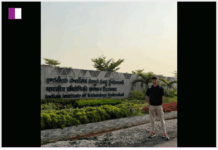New Report Highlights India’s Proactive Approach to Skill Development
New Delhi, December 09, 2024 –The Global Labor Market Conference (GLMC), the world’s premier forum for workforce development and labor market insights, has released a report shedding light on how rapidly evolving technologies are reshaping global employment. Navigating Tomorrow: Mastering Skills in a Dynamic Global Labor Market underscores India’s pivotal role in the Global South’s response to artificial intelligence and automation, showcasing the country’s workers as frontrunners in skill development and technological adaptation.
India’s Workers Rise to Meet the Challenge of the Tech Era
With over 70% of Indian professionals actively seeking opportunities to upskill, the report identifies India as a global leader in technological adaptation. The dynamic nature of India’s job market, where artificial intelligence, machine learning, and automation are becoming integral, drives this proactive stance.

Key Insights:
- Higher Trust in Government Compared to Other Markets: While global trust in governments to support upskilling remains low at 20%, Indian respondents (31%) and those in Saudi Arabia (35%) demonstrated significantly higher confidence in their governments. In contrast, countries like the USA (15%) and UK (12%) reported markedly lower trust levels. Indian respondents also expressed 49% trust in businesses, further emphasizing the private sector’s role in workforce development.
- Technological Change is Driving Urgency for Skills Development: The urgency to reskill due to technological advancements is a shared concern among Indian workers, with 55% fearing that their skills could become partially or fully obsolete within the next five years. This places India in line with the global trend, where similar concerns are expressed by 61% in Brazil and 60% in China, compared to lower levels in developed markets such as the UK (44%) and Australia (43%).
- Climate Change Spurs Skills Development in Key Sectors: Climate change is a more significant driver of upskilling or reskilling in India, with 32% of respondents identifying it as a factor influencing their reskilling decisions in the next five years. This aligns with countries like China (41%) and Vietnam (36%) but contrasts with countries such as the UK (14%) and USA (18%), where climate change has a comparatively lower impact on skills development priorities.
- Barriers to Skill Development Persist: Barriers to upskilling or reskilling remain consistent globally, with Indian respondents citing lack of time (40%) and financial constraints (38%) as primary challenges. Similar patterns are observed in Brazil, where 43% report lack of time and 39% financial constraints, and in South Africa, where 45% and 42% respectively cite these barriers. In contrast, respondents in developed markets like Norway and the UK report fewer obstacles. In Norway, only 27% cite lack of time and 28% financial constraints, while in the UK, the figures are 31% and 24%, respectively, reflecting the impact of stronger support systems in these countries. These variations highlight the differing levels of accessibility and institutional support across global regions.
- Emphasis on STEM, Cognitive, and Socio-Emotional Skills: When considering the future of skills, respondents in the APAC region, including India, prioritized cognitive skills (54%) and STEM capabilities (38%) as essential for thriving in a technology-driven economy. In contrast, socio-emotional skills were more valued in service-oriented economies such as the USA and the EU, with 39% and 41% of respondents prioritizing these skills, respectively. Meanwhile, in Africa and LATAM, STEM skills are relatively lower in priority at 30% and 34%, respectively, while entrepreneurial skills gained prominence in Africa (47%). These variations highlight regional differences in workforce priorities and the influence of economic structures on skill demand.
India’s Position in the Global Context
India’s proactive stance on upskilling (55%) for the next five years contrasts sharply with trends in more developed markets like the US (51%), UK (44%), and Australia (49%), where fewer workers reported urgency to reskill due to technological change. Additionally, 26% of Indian respondents expressed anxiety about job automation, showing a more optimistic outlook compared to 36% in China, which leads as the most technologically anxious market. These figures highlight the Indian workforce’s balanced awareness and proactive approach to navigating an AI-driven economy.
The full report and an executive summary of the findings is attached.
The Global Labor Market Conference will host the second edition of its annual meeting at the King Abdulaziz International Convention Center in Riyadh January 29-30, 2025.
Registration for the 2025 event is now open. If you are interested in attending, please register here.
About The Global Labor Market Conference
The Global Labor Market Conference (GLMC) is the only collaborative platform shaping the future of the global labor market through insights, ideas, trends, dialogue, knowledge sharing and the exchange of data on a continuous basis. By fostering a global community of like-minded people, GLMC sparks innovative solutions to labor market challenges, empowering stakeholders to make well-informed decisions.
In the second edition of its annual conference, taking place in Riyadh from 29-30 January 2025, GLMC will convene and connect people from all over the world to offer invaluable insights on upskilling and reskilling, leveraging digital technologies, boosting productivity, bridging the gap between young workers’ aspirations and labor market realities, curbing brain drain, transitioning to a greener economy, and enabling SMEs to create more meaningful jobs. GLMC’s 2025 agenda will open with a roundtable attended by more than 40 labor ministers and will feature more than 200 speakers including CEOs, international experts and public sector leaders from more than 50 countries across the world.
About Navigating Tomorrow: Mastering Skills in a Dynamic Global Labour Market
The central feature of this report is the use of an innovative survey to probe labor market participants’ attitudes, fears and expectations about their skill sets and prospects in the face of global trends. Data was collected across 14 countries (listed below). For each country, the sample size was set at 1,000 for a total of 14,000. Individuals surveyed were aged 18+ and were either employed, unemployed, or self-employed.
Country coverage:
- Australia
- Brazil
- China
- India
- Japan
- Jordan
- Nigeria
- Norway
- Saudi Arabia
- South Africa
- Spain
- UK
- USA
- Vietnam



































